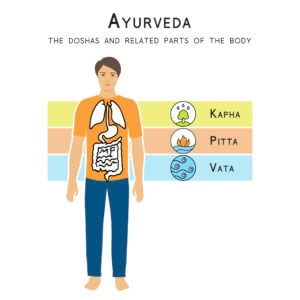The Science of Ayurveda and Its Impact on Personal Wellness
The Science of Ayurveda and Its Impact on Personal Wellness
Blog Article
Why You Need to Get involved in Ayurveda for a Well Balanced Way Of Life Today
In an era significantly defined by anxiety and imbalance, checking out Ayurveda offers a compelling possibility for individuals seeking a more harmonious lifestyle. This ancient practice offers a special framework for understanding individual health and wellness via the lens of individual constitution, or dosha, enabling customized approaches to diet, workout, and mental well-being. As we uncover the principles that underpin this alternative system, it ends up being obvious that the benefits extend past mere symptom monitoring, inviting a much deeper query right into lasting wellness practices that reverberate with one's real nature - Ayurveda. What insights can Ayurveda disclose about your own path to wellness?
Understanding Ayurveda Basics
Ayurveda, an ancient system of medication originating from India, acts as a holistic method to health and wellness. Central to Ayurveda is the understanding of the 3 doshas: Vata, Pitta, and Kapha. These doshas represent the basic powers that govern psychological and physiological features within the body. Each private possesses an unique constitution, or prakriti, identified by the balance of these doshas, which influences their wellness, vulnerability, and habits to condition.
Ayurveda stresses the interconnectedness of mind, body, and spirit, advocating for customized therapies that attend to the origin of disorders instead than just alleviating symptoms. This system uses different analysis strategies, including pulse medical diagnosis and monitoring, to determine discrepancies within the doshas and suggest customized interventions.
Diet, lifestyle, organic treatments, and detoxification practices, referred to as Panchakarma, play a substantial function in restoring balance. Ayurveda acknowledges the relevance of ecological and seasonal impacts on wellness, directing individuals to adapt their regimens accordingly. By cultivating awareness of one's special constitution and the all-natural rhythms of life, Ayurveda supplies a comprehensive framework for achieving optimal health and wellness and wellness.
Advantages of an Ayurvedic Way Of Life
Accepting an Ayurvedic way of life uses countless benefits that improve total health and advertise an unified presence. Central to Ayurveda is the principle of equilibrium, which fosters physical health and wellness, mental clarity, and emotional security. Embracing this all natural strategy encourages individuals to straighten their day-to-day regimens with their special constitution, or dosha, bring about individualized wellness benefits.
One significant benefit of Ayurveda is its focus on precautionary care. By concentrating on keeping equilibrium and health, individuals can lower the danger of chronic conditions and wellness issues. Furthermore, Ayurveda promotes organic and natural foods, which can improve food digestion and increase immunity.
Furthermore, the assimilation of mindfulness methods, such as meditation and yoga exercise, improves mental wellness by minimizing anxiety and stress and anxiety levels. The all natural nature of Ayurveda likewise supports detoxification via numerous therapies, which can revitalize the mind and body.
Incorporating Ayurvedic concepts can cause enhanced sleep quality, raised energy levels, and a greater sense of vitality. Inevitably, an Ayurvedic way of life cultivates an extensive connection with oneself and the atmosphere, promoting a sense of tranquility and fulfillment in day-to-day live.
Trick Ayurvedic Practices to Execute
Just how can individuals flawlessly incorporate Ayurvedic practices into their every day lives? By adopting a few basic see here principles, one can cultivate an all natural approach that improves total well-being.
First, developing a day-to-day routine, or "Dinacharya," is vital. This consists of getting up early, preferably at dawn, to align with natural rhythms. Including practices such as tongue scuffing, oil drawing, and a warm lemon water clean can advertise cleansing and gastrointestinal health and wellness.


Next, focus on a balanced diet based upon specific constitution or "dosha." Incorporating locally-sourced and seasonal foods boosts vitality. Favor whole, unprocessed foods, and highlight tastes that represent your dosha to accomplish consistency.
Mindfulness methods are also necessary. Participate in daily meditation or yoga to promote psychological quality and psychological balance. Breathing exercises, or "pranayama," can even more support stress reduction.

Personalizing Your Ayurvedic Journey

Once you identify your dosha, explore particular practices that complement it. Vata kinds might benefit from grounding foods and calming regimens, while Pitta people must focus on hydrating foods and cooling methods. Kapha types can thrive on stimulating tasks and light, stimulating meals.
Ayurveda urges adapting your regimens according to the changing periods to maintain consistency. By embracing this tailored method, you can grow a holistic lifestyle Full Report that promotes sustained health and vigor.
Incorporating Ayurveda Into Daily Life
The keystone of a fulfilling Ayurvedic way of life lies in the smooth integration of its principles right into everyday regimens. navigate here This combination begins with recognizing your distinct dosha, or constitution, which educates dietary choices, everyday tasks, and even psychological health. Begin your day with an early morning routine that includes tongue scuffing and cozy water with lemon to clean the digestive system.
Nutrition plays a crucial function; integrate seasonal, entire foods that stabilize your dosha. As an example, if you are mostly Vata, concentrate on warm, moist foods to ground your energy.
Including organic supplements can better enhance balance. Turmeric, ginger, and ashwagandha are outstanding options, however constantly talk to an Ayurvedic professional for personalized recommendations.
Mindfulness practices, such as yoga and meditation, assistance cultivate mental clearness and psychological stability. Go for a consistent practice that lines up with your daily schedule, also if it's just for a few minutes.
Last but not least, focus on rest by establishing a regular bedtime routine that consists of calming tasks, like reading or gentle stretching. By methodically weaving these Ayurvedic practices into your life, you can cultivate a unified and well balanced presence, improving both physical health and wellness and psychological clearness.
Conclusion
Integrating Ayurveda into everyday life offers a path to achieving alternative balance and well-being. Inevitably, Ayurveda offers as a beneficial framework for boosting physical wellness, psychological clarity, and emotional security, advertising a balanced lifestyle in the modern-day world.
Ayurveda recognizes the significance of seasonal and ecological influences on wellness, guiding individuals to adapt their routines appropriately. By promoting recognition of one's one-of-a-kind constitution and the all-natural rhythms of life, Ayurveda offers an extensive structure for accomplishing optimum wellness and health.
Central to Ayurveda is the principle of equilibrium, which cultivates physical wellness, psychological quality, and psychological security. The significance of Ayurveda exists in its emphasis on individuality; each person's constitution, or dosha, plays a crucial role in identifying the most effective practices for achieving equilibrium. Inevitably, Ayurveda offers as a useful structure for improving physical health and wellness, mental clarity, and psychological security, promoting a balanced lifestyle in the modern-day globe.
Report this page